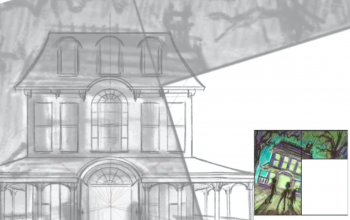 Recently for one reason or another I found myself contemplating the old board game Dark Tower. For those that don’t remember it, this was a board game that featured a large electronic device in the center (the titular dark tower) that did some random number generation and supplied sound effects and other minor visuals. Here’s the original commercial (starring Orsen Wells!) and a more recent video playthrough. This game has still has a pretty sizable cult following, and due to the unreliable nature of the circa 1981 electronics, it’s pretty collectible. I never had or even played this game as a kid, but I was certainly aware of it, and eventually Delta introduced me to a pretty good simulator online.
Recently for one reason or another I found myself contemplating the old board game Dark Tower. For those that don’t remember it, this was a board game that featured a large electronic device in the center (the titular dark tower) that did some random number generation and supplied sound effects and other minor visuals. Here’s the original commercial (starring Orsen Wells!) and a more recent video playthrough. This game has still has a pretty sizable cult following, and due to the unreliable nature of the circa 1981 electronics, it’s pretty collectible. I never had or even played this game as a kid, but I was certainly aware of it, and eventually Delta introduced me to a pretty good simulator online.
Anyway, I was pondering the game for unknown reasons, and thinking about the process of finding and repairing parts to put together a working physical version. Not that I have any such plan to do so, but I was just curious about the electronics and the repair hobby, in the same way that I’m fascinated by guys who collect and repair pinball machines, but would never really want to get into it myself. Anyway, I happened upon an android app called Droid Tower, which is both a full simulator and just a tower simulator – the purpose of the latter being that maybe you own a copy of the game but your tower no longer works: now you can play again using your smart phone instead.
This idea of replacing the tower with an app tickled me. Then I started wondering, why aren’t there more hybrid games that have both physical and virtual components? The only other example I can think of is the way I play Space Alert. The original game comes with a CD of audio tracks that actually drive the gameplay, and eventually I replaced that with mp3’s on my phone, and then later the Space Alert Mission Generator app, which actually generates random missions by assembling different audio elements. That last bit is what I think makes it cross the line into actual software that affects the game.
 Also, I wonder what other existing games could benefit by having some element replaced by software? The first idea that came to my mind is Hero Quest. This game includes a GM type player that must lay out the contents of the dungeon the other players are exploring. It includes a booklet of adventures, in a sequence that presents a sort of story line, for the GM to follow. The later iteration of this game, Warhammer Quest, eliminates the GM in favor of random dungeon generation and algorithmic movement of enemies. I wonder though if one could preserve the pre-authored feel of the adventures by simply having a piece of software present it to the players. It could speak out where to place the elements as the players reach them. I’m not sure exactly how to achieve this, maybe some kind of recognition of the board and pieces via the phone’s camera? I suppose you could replace the board entirely with an interactive surface, but I think this breaks some of the feel I’m after here. I want to play the original game, just with a computer playing the GM role instead of a real person.
Also, I wonder what other existing games could benefit by having some element replaced by software? The first idea that came to my mind is Hero Quest. This game includes a GM type player that must lay out the contents of the dungeon the other players are exploring. It includes a booklet of adventures, in a sequence that presents a sort of story line, for the GM to follow. The later iteration of this game, Warhammer Quest, eliminates the GM in favor of random dungeon generation and algorithmic movement of enemies. I wonder though if one could preserve the pre-authored feel of the adventures by simply having a piece of software present it to the players. It could speak out where to place the elements as the players reach them. I’m not sure exactly how to achieve this, maybe some kind of recognition of the board and pieces via the phone’s camera? I suppose you could replace the board entirely with an interactive surface, but I think this breaks some of the feel I’m after here. I want to play the original game, just with a computer playing the GM role instead of a real person.
What else? Anyone aware of any existing physical games that augment gameplay with software? Anyone got a really good idea they’d like to share for such?



No new projects for you until we finish painting the living room!! 😉
I wonder if the hybrid-ness of that kind of game is what puts toy/game companies off. It definitely makes is tricky for marketers, who like things in easy to sell categories. Do potential buyers look at it and say: “Why do I need to buy all this extra junk to play a video game?” or maybe the developer’s look at the extra cost and doing something outside their wheelhouse. (Computer/media for traditional game companies and manufacturing board and game pieces for a game/media developer.)
I think a past history of the accompanying video/media being a bit sub par, like the D&D VHS play along stuff of ancient days, kinda puts players off a bit.
Someday, maybe, we’ll see a partnership of both the physical and CG game development biz come together and create something that plays to both sides’ strengths.
That being said, I LOVE Space Alert. I always envision it as the deposition of a lawsuit after the space rocks have hit the fan and somebody has to take the blame for the (inevitable) explosive failure of the mission.
@Jenn – There’s no new project here, just mental exercises. And you know, you could start taping the LR walls any time you want.
@BJ – Yeah, I guess ultimately both sides of the fence would look at this and ask, why do twice the work? Why not just make one project. Still, now that almost everyone is carrying tiny computers around in their pockets and print on demand is so low, it feels like the barriers must be shrinking. There’s a good idea here somewhere, I just can’t seem to put my finger on it.
Also, yes, Space Alert is a great game.
And here are a couple interesting games that seem to be straddling the boundary:
http://yoho.io/
http://golemarcana.com/